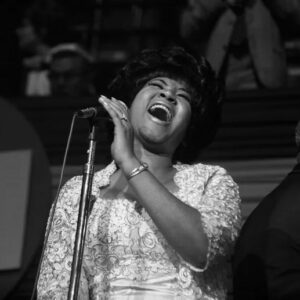Aretha Franklin is undoubtedly one of the most powerful and enduring icons in American music history. Her unparalleled vocal range, emotional depth, and profound influence on soul, R&B, and pop music have solidified her as the “Queen of Soul.” But while her musical genius is the cornerstone of her legacy, Aretha Franklin’s impact extends far beyond the studio and the stage. The Queen of Soul was also a fashion icon, whose personal style was as bold, beautiful, and groundbreaking as her music. Throughout her career, Franklin used fashion not only as a means of self-expression but as a powerful tool of empowerment. Her clothing choices, hairstyles, and accessories became integral to her identity, offering a visual representation of her strength, beauty, and unyielding confidence.
This article explores the fashion legacy of Aretha Franklin, examining how her unique style conveyed messages of empowerment, elegance, and cultural pride. From her glamorous red-carpet moments to her unapologetically bold stage outfits, Franklin’s fashion was deeply connected to her musical identity. In a world where the boundaries of art and style often intersect, Aretha Franklin’s fashion remains a timeless testament to the power of personal expression.
Introduction: Aretha Franklin’s Cultural Impact
Aretha Franklin’s musical career was an extraordinary journey, one that spanned over six decades and influenced generations of artists across all genres. She was not only a gifted singer and songwriter but also a cultural and social force. Aretha’s music was a reflection of her inner strength, resilience, and deep commitment to authenticity. However, it was her presence—both on and off the stage—that elevated her status to icon. Her unapologetic sense of self, her unwavering commitment to her roots, and her ability to command a room with her voice, her personality, and her style made Aretha Franklin a true cultural phenomenon.
Her style was inextricably tied to her musical persona. The same confidence that powered her vocal performances was reflected in her clothing choices. Aretha didn’t just wear clothes—she made a statement with them. Whether she was draped in a regal fur stole or sporting a bold and graphic African-inspired print, Aretha’s outfits spoke volumes. Her style was an embodiment of the themes she explored in her music: love, strength, faith, and pride.
Bold and Powerful Fashion Statements
Aretha Franklin was a woman who knew how to make a statement, both with her voice and with her clothes. In the 1960s and 1970s, when she was at the height of her career, the music world was filled with an eclectic mix of styles, ranging from bohemian to mod, psychedelic to glam rock. But Aretha carved out a space of her own, embracing bold, statement-making outfits that reflected her confidence, artistry, and cultural pride.
Her fashion was often grand and luxurious, characterized by dramatic silhouettes, oversized accessories, and rich fabrics. Whether performing at the Apollo Theater or attending an awards show, Aretha knew how to dress for impact. Her style could be glamorous, as seen in her penchant for sequins, satin, and luxurious velvet, yet it was never overdone or ostentatious. Instead, Aretha’s clothing choices exuded an air of understated regal elegance, with each outfit carefully curated to reflect her unique position as a music and cultural icon.
One of her signature looks included voluminous skirts and gowns that emphasized her curvy figure, showing that she embraced her body without reservation. Her towering platform heels, often glittering with sequins, became a trademark, elevating her both literally and figuratively. Franklin also famously wore oversized accessories—chunky gold chains, large statement earrings, and wide-brimmed hats. These accessories were more than just fashion; they were emblematic of her bold personality and powerful presence. She often wore luxurious fur coats and long, flowing capes, which became synonymous with her image as the Queen of Soul.
Perhaps most notably, Aretha’s clothes always appeared to be tailored to perfection, reflecting her understanding of the importance of a well-fitting garment. It wasn’t about following trends; it was about cultivating a look that represented her personal style, artistry, and unwavering sense of confidence.
Afrocentric Influence and Natural Beauty
As a trailblazer for cultural and racial pride, Aretha Franklin’s personal style also played a significant role in the popularization of the natural hair movement. In the 1960s and 1970s, many African American women were fighting against Eurocentric standards of beauty, and Aretha became one of the most visible figures embracing her natural, textured hair. She wore her natural curls with pride, rejecting the chemically straightened styles that had dominated mainstream beauty standards.
Aretha’s natural hair was not just a beauty choice—it was a political statement. By wearing her hair in its natural state, Aretha asserted ownership over her appearance and rejected the pervasive pressures to conform to a white-dominated beauty ideal. She demonstrated to her fans that beauty came in all forms, and that self-acceptance was an act of empowerment. This embrace of natural beauty resonated deeply with African American women and girls, offering them a model of beauty that reflected their own identities.
In addition to her natural hair, Aretha was also known for incorporating Afrocentric fashion into her wardrobe. She embraced African-inspired prints, fabrics, and headwraps, which became part of her signature style. These bold patterns and colors not only celebrated her African heritage but also became part of the larger cultural movement of Black empowerment in the 1960s and 1970s. Aretha’s headwraps, often brightly colored and intricately designed, became symbolic of her deep connection to her roots and her commitment to representing Black excellence.
By incorporating these elements into her everyday wardrobe, Aretha Franklin made it clear that her identity was multifaceted—she was a talented artist, a proud Black woman, and a woman who valued her heritage. She used her fashion to honor her cultural roots and, in doing so, became a role model for countless others.
Elegance and Empowerment: A Fashion Statement with Purpose
Aretha Franklin’s fashion choices were never frivolous; each outfit carried an underlying message of empowerment, strength, and sophistication. She understood that clothes could communicate a great deal about one’s character, and she used her wardrobe to project an image of a strong, independent, and elegant woman who was unafraid to occupy space in a world that often tried to silence or diminish her.
Her ability to effortlessly blend glamour with empowerment was a testament to her strength as a woman and as an artist. Whether she was performing on stage, sitting for a portrait, or attending an event, Aretha’s fashion was always about making a statement. Her clothing conveyed a sense of grace, but it was a grace that was firmly rooted in power. She was never afraid to dress boldly, to wear colors that demanded attention, or to choose designs that made her stand out in a crowd.
In an era when many women, especially women of color, were constrained by limited options and restrictive beauty standards, Aretha’s fashion was an act of rebellion. She rejected the notion that women should look demure, soft, or passive. Instead, she embraced a style that was assertive, regal, and full of life. She proved that fashion could be both beautiful and politically significant, a tool to challenge the status quo and assert one’s worth.
Moreover, Aretha’s style was a beacon of body positivity. She was unapologetic about her curves, and she used her clothes to celebrate her body rather than conceal it. In an industry that often prioritized slim, conventionally “ideal” bodies, Aretha Franklin’s fashion choices communicated a powerful message: there is no one “right” way to look. Her wardrobe was an affirmation of self-love, self-respect, and body acceptance.
Aretha Franklin’s Fashion Legacy Today
Even years after her death in 2018, Aretha Franklin’s fashion legacy continues to inspire designers, celebrities, and fans alike. Her bold, unapologetic sense of style has left an indelible mark on the fashion world, and her influence can still be seen in modern fashion trends.
Current fashion icons like Beyoncé, Rihanna, and Solange have all cited Aretha as a source of inspiration for their own bold, boundary-pushing style. These artists, like Aretha, embrace their bodies and their cultural identities, using fashion as a means of self-expression and empowerment. Beyoncé, in particular, has frequently drawn from Aretha’s sense of regality, donning intricate, luxurious garments that reflect her own sense of power and grace. Solange, with her unique Afrocentric aesthetic, has embraced bold prints, natural hair, and striking headwraps, all of which are reminiscent of Aretha’s iconic looks.
Designers have also been influenced by Aretha’s distinctive style. Brands like Valentino, Versace, and Jean Paul Gaultier have all referenced Aretha’s glamorous stage costumes and dramatic silhouettes in their collections. Her love for oversized accessories and bold prints continues to inspire fashion designers who seek to create pieces that exude both sophistication and empowerment.
Aretha Franklin’s fashion legacy transcends the boundaries of music and fashion. She remains a trailblazer who used her appearance as a platform for self-expression, cultural pride, and empowerment. Her style is a powerful reminder that fashion, like music, is an art form that can move people, challenge norms, and elevate the spirit.
Conclusion
Aretha Franklin was a master of using fashion to express her identity and artistry. From her regal, statement-making gowns to her embrace of Afrocentric styles and natural beauty, Aretha’s fashion choices were as bold, elegant, and empowering as her music. Her fashion legacy endures today, inspiring new generations to embrace their bodies, express their cultural pride, and use style as a tool for self-expression. Aretha Franklin will forever be remembered not only for her unparalleled musical talent but for her role in redefining what it means to be a powerful, fashionable woman.





